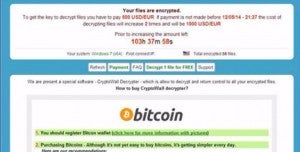BBB Scam Alert – virus that holds your computer for ransom
Published 2:25 pm Monday, July 20, 2015
BEAUMONT — The ransomware scam is back and more vicious than ever, according to a new FBI report. Ransomware is a virus that freezes your computer, holding it ransom until you pay to unlock it. Victims are reporting losing up to $10,000 in a new version of this scam that encrypts your files.

How the Scam Works:
You click on an infected advertisement, link or email attachment. Suddenly, a pop up appears. The screen tells you that all the files on your computer have been encrypted, making them useless unless you have a key to decode them.
This new version of ransomware is appropriately named CryptoWall. Of course, decoding your files doesn’t come free. Different versions charge anywhere from $200 to $10,000.
Most versions of this scam demand payment in Bitcoin. The online currency is decentralized and anonymous, making it a new favorite method of payment for scammers. Like pre-paid debit cards and wire transfers, if you pay with Bitcoin, it’s like paying in cash.
To remove the virus without paying the scammers, try running a scan on your computer to identify and delete the malicious files. If you are unable to remove the malware, you may need to wipe your machine’s hard drive and reinstall files and software.
Protect Yourself from a Ransomware Scam
Avoid ransomware scams by not downloading one. Here are some suggestions:
• Always use antivirus software and a firewall. Protect your computer (and your cell phone) by using antivirus software and a firewall from a reputable company.
• Update your software regularly. The regular reminders to update your browsers and other software are annoying, but they are for a good reason. These updates protect against the constantly evolving viruses and system vulnerabilities.
• *Enable popup blockers. Popups are regularly used by scammers to spread malware. Prevent them from appearing in the first place by adjusting your browser settings.
• Be skeptical. Don’t click on emails or attachments you don’t recognize, and avoid suspicious websites.
• Always back up the content on your computer. If you back up your files, ransomware scams will have limited impact. If you are targeted, you can simply have your system wiped clean and reload your files.
For More Information
See the full alert from the FBI’s Internet Crime Complaint Center at http://www.ic3.gov/media/2015/150623.aspx
To report a scam, visit BBB Scam Tracker at http://www.bbb.org/scamtracker/southeast-texas//
To find out more about other scams, go to BBB Scam Stopper at www.bbb.org/scam. In Southeast Texas, call 409/835-5348 or 855/BBB-SETX.





